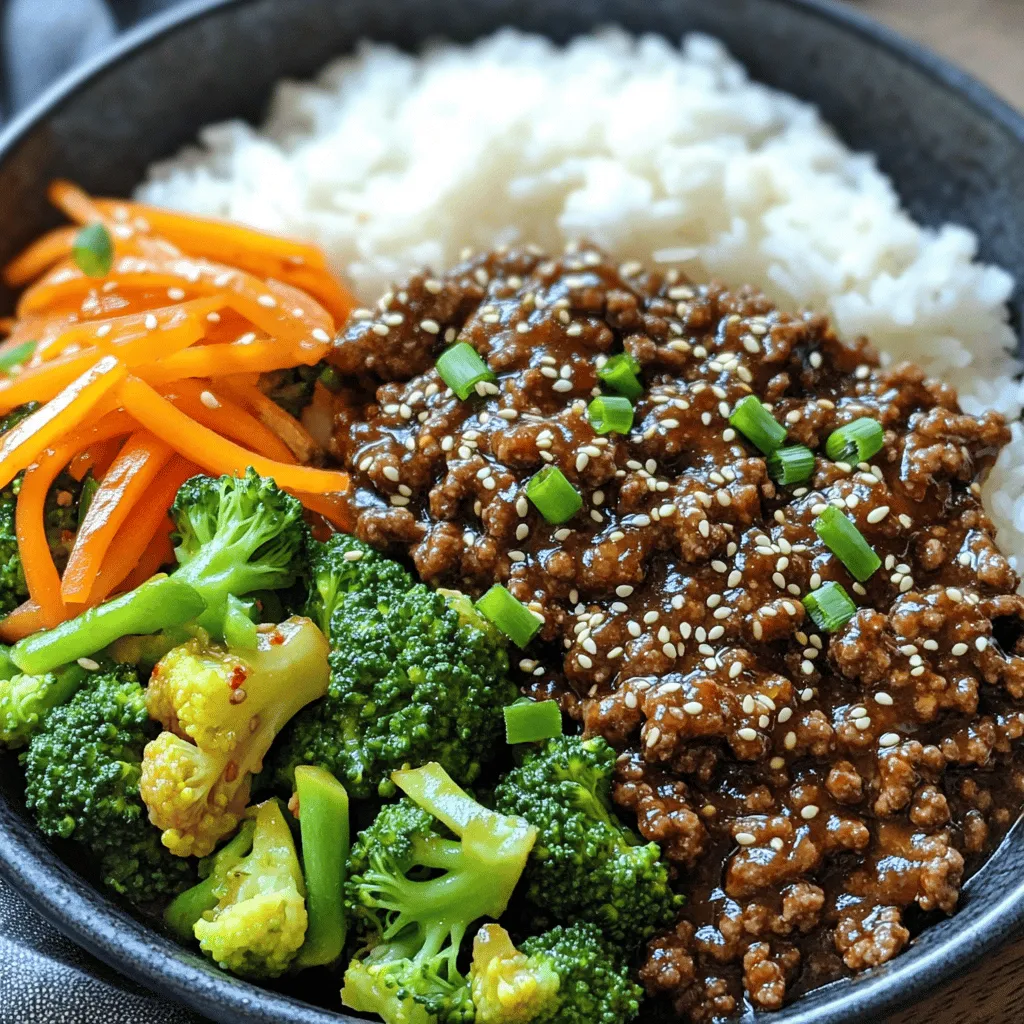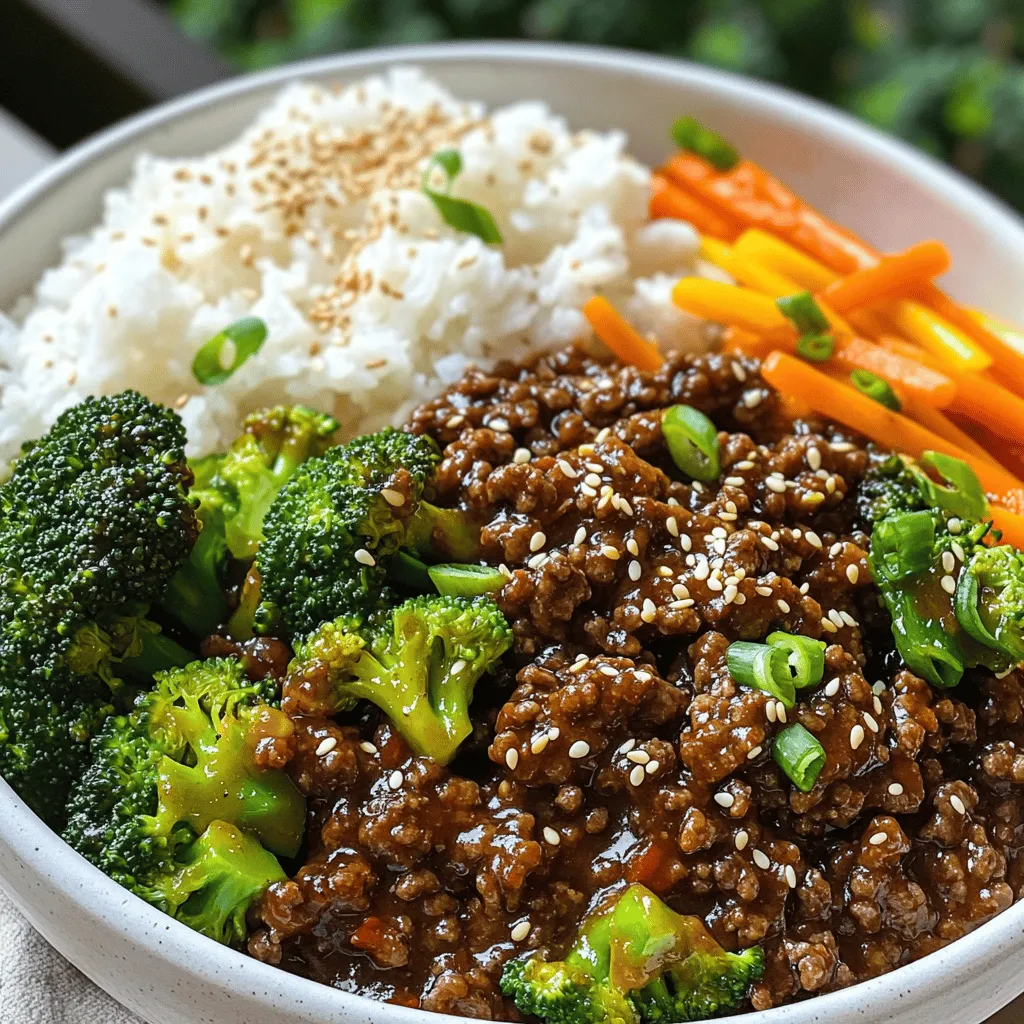Korean Beef Bowls are a tasty and quick meal you can make any night. With just a few simple ingredients like ground beef, sesame oil, and gochujang sauce, you can create a flavor-packed dish that your whole family will love. I’ll walk you through easy steps to make this dish, plus tips for perfecting every bite. Let’s turn your weeknight dinner into something special with Korean Beef Bowls!
Ingredients
Main Ingredients
– 1 lb ground beef (80% lean)
– 1 tablespoon sesame oil
– 4 cloves garlic, minced
– 1 inch ginger, grated
Sauces and Seasonings
– 1/4 cup soy sauce (low sodium)
– 1 tablespoon gochujang (Korean chili paste)
– 2 tablespoons brown sugar
Vegetables and Garnish
– 2 green onions, chopped
– 1 cup broccoli florets
– Sesame seeds for garnish
Gathering these ingredients is simple. The ground beef gives a rich flavor. Sesame oil adds nutty notes. Garlic and ginger bring warmth and depth.
Next, we have the sauces. Soy sauce adds saltiness. Gochujang gives heat and sweetness. Brown sugar balances the spice. Each helps create a bold, savory taste.
For the vegetables, green onions add freshness. Broccoli adds crunch and color. Sesame seeds finish the dish with a delightful touch.Enjoy the process of cooking and savor every bite!
Step-by-Step Instructions
Preparing the Beef Mixture
1. Heat sesame oil in a large skillet over medium-high heat.
2. Add minced garlic and grated ginger. Sauté for about 30 seconds until fragrant.
3. Next, add the ground beef. Break it apart with a spatula.
4. Cook the beef for about 5-7 minutes, until it is browned and cooked through.
Adding Flavors
1. Stir in the soy sauce, brown sugar, and gochujang. Mix well.
2. Let it simmer for an additional 2 minutes.
3. To thicken the sauce, mix in the cornstarch and water mixture.
4. Stir until the sauce coats the beef. Remove from heat and add green onions.
Cooking Vegetables
1. In another pan, heat olive oil over medium heat.
2. Add broccoli florets and julienned carrot. Sauté for about 4-5 minutes until tender but crisp.
3. To assemble, scoop rice into a bowl.
4. Top with the beef mixture and add the sautéed vegetables on the side.
5. Finish with a sprinkle of sesame seeds for garnish.
Tips & Tricks
Perfecting the Flavor
To make your Korean beef bowls shine, start with gochujang. This paste adds heat and a rich taste. If you want less spice, use less gochujang. You can also mix in a bit of honey for sweetness. This balance helps make every bite enjoyable.
When browning the beef, break it into small pieces. Don’t overcrowd the pan. This helps the meat brown evenly. Cook it over medium-high heat for a nice sear. You want those delicious brown bits for flavor.
Cooking Techniques
Sautéing veggies is easy if you follow some rules. First, heat your pan before adding oil. This prevents sticking. Add the broccoli and carrots and keep them moving. Cook until they’re bright and crisp, about 4-5 minutes. This keeps their nutrients and crunch.
For the rice, the right consistency matters. If you use white rice, rinse it before cooking. This removes excess starch and keeps it fluffy. If you prefer brown rice, cook it a bit longer. Aim for tender, not mushy.
Plating Suggestions
When you plate your Korean beef bowls, be creative. Start with a scoop of rice at the bottom of the bowl. Then add the beef mixture on top. Arrange the sautéed veggies on the side for color and texture.
Garnishing makes a big difference. Sprinkle sesame seeds over the top for a nice touch. You can also add chopped green onions for freshness. A little drizzle of sesame oil adds shine and flavor, making your dish look and taste great.

Variations
Protein Choices
You can switch the ground beef for chicken or tofu. Chicken is leaner and cooks quickly. Tofu is great for a vegetarian option. Just make sure to press the tofu first to remove excess water. If you have leftover steak, use it for a fast meal. Slice it thinly and add it to the sauce. This way, you save time and reduce waste.
Ingredient Swaps
If you don’t have soy sauce, tamari works well too. Tamari is similar but usually gluten-free. You can also add more veggies to your dish. Try bell peppers, snap peas, or mushrooms. These will add color and nutrients, making your meal even better.
Serving Suggestions
Serve your beef bowls with different types of rice. White rice is classic, but brown rice adds fiber. You can also try jasmine or cauliflower rice for a twist. Don’t forget to pair your bowls with kimchi or pickled vegetables. These add a nice crunch and tang, making your meal more exciting.
Storage Info
Refrigeration Guidelines
To keep your Korean Beef Bowls fresh, store leftovers right away. Place them in an airtight container. This helps keep the flavors intact and prevents any odor from spreading in your fridge. Always let the beef cool before sealing it. Use the beef mixture and veggies within three days for the best taste.
Freezing Instructions
To freeze the beef mixture, let it cool completely. Place it in a freezer-safe bag, squeezing out as much air as possible. For the veggies, blanch them briefly in hot water before freezing. This helps keep their color and crunch. You can freeze both separately for up to three months. When you’re ready to eat, thaw them in the fridge overnight for easy meal prep.
Reheating Suggestions
For reheating, the stovetop is best. Place the beef mixture in a pan and heat it over low-medium heat. This keeps the flavors rich and delicious. Stir often to prevent sticking. For the rice, add a splash of water before reheating. This helps maintain its fluffy texture. Enjoy your meal just like it was freshly made!
FAQs
How do I make Korean Beef Bowls spicy?
To make Korean Beef Bowls spicy, add more gochujang. You can also mix in crushed red pepper flakes. Start with a small amount, and taste as you go. This way, you can control the heat level. Some people like it hot, while others prefer mild flavors.
Can I prepare Korean Beef Bowls ahead of time?
Yes, you can prepare Korean Beef Bowls ahead of time. Cook the beef mixture and store it in the fridge. Sauté the vegetables separately, too. When ready to eat, just reheat both and serve over rice. This makes weeknight meals quick and easy.
What side dishes pair well with Korean Beef Bowls?
Korean Beef Bowls go well with various side dishes. Here are some great options:
– Kimchi
– Cucumber salad
– Pickled radishes
– Steamed bok choy
These sides add flavor and texture to your meal.
Where can I find authentic Korean Beef Bowls near me?
To find authentic Korean Beef Bowls, check local Korean restaurants. Look for reviews online to ensure quality. Many places offer takeout options, so you can enjoy them at home. You can also ask friends for recommendations.
What can I use if I don’t have gochujang?
If you don’t have gochujang, you can use a mix of chili paste and sugar. Sriracha also works in a pinch. Adjust the amounts to match your taste preference. Some people like to add a little soy sauce for extra umami.
This article covered the key ingredients and step-by-step instructions for Korean Beef Bowls. You learned about the main components, including ground beef and sesame oil, and how to mix flavors with sauces. I shared tips for perfecting flavor and techniques for cooking vegetables. Explore variations for different proteins and side dishes that enhance your meal. Remember, proper storage helps keep your leftovers fresh. With these insights, you can make delicious and customized Korean Beef Bowls at home. Enjoy your cooking journey!




